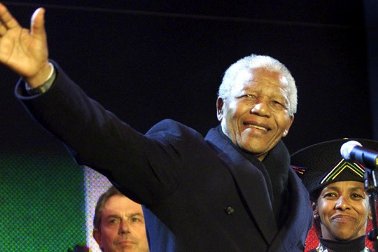ARTICLE
Nelson Mandela, Revered Statesman and Anti-Apartheid Leader, Dies at 95
POSTED BY WLAS December 6th, 2013 0 COMMENTS
 Freedom fighter, statesman, moral compass and South Africa’s symbol of the struggle against racial oppression. That was Nelson Mandela, who emerged from prison after 27 years to lead his country out of decades of apartheid. He died Thursday night at age 95.
Freedom fighter, statesman, moral compass and South Africa’s symbol of the struggle against racial oppression. That was Nelson Mandela, who emerged from prison after 27 years to lead his country out of decades of apartheid. He died Thursday night at age 95.
His message of reconciliation, not vengeance, inspired the world after he negotiated a peaceful end to segregation and urged forgiveness for the white government that imprisoned him.
“As I walked out the door toward the gate that would lead to my freedom, I knew if I didn’t leave my bitterness and hatred behind, I’d still be in prison,” Mandela said after he was freed in in 1990.
Mandela, a former president, battled health issues in recent years, including a recurring lung infection that led to numerous hospitalizations. Despite rare public appearances, he held a special place in the consciousness of the nation and the world.
“Our nation has lost its greatest son. Our people have lost a father,” South African President Jacob Zuma said. “What made Nelson Mandela great was precisely what made him human. We saw in him what we seek in ourselves.”
His U.S. counterpart, Barack Obama, echoed the same sentiment. “We’ve lost one of the most influential, courageous and profoundly good human beings that any of us will share time with on this Earth,” Obama said. “He no longer belongs to us — he belongs to the ages.”
A hero to blacks and whites. Mandela became the nation’s conscience as it healed from the scars of apartheid. His defiance of white minority rule and long incarceration for fighting against segregation focused the world’s attention on apartheid, the legalized racial segregation enforced by the South African government until 1994.
In his lifetime, he was a man of complexities. He went from a militant freedom fighter, to a prisoner, to a unifying figure, to an elder statesman. Years after his 1999 retirement from the presidency, Mandela was considered the ideal head of state. He became a yardstick for African leaders, who consistently fell short when measured against him.
Warm, lanky and charismatic in his silk, earth-toned dashikis, he was quick to admit to his shortcomings, endearing him further in a culture in which leaders rarely do. His steely gaze disarmed opponents. So did his flashy smile.
Former South African President F.W. de Klerk, who was awarded the Nobel Peace Prize with Mandela in 1993 for transitioning the nation from a system of racial segregation, described their first meeting.
“I had read, of course, everything I could read about him beforehand. I was well-briefed,” he said. “I was impressed, however, by how tall he was. By the ramrod straightness of his stature, and realized that this is a very special man. He had an aura around him. He’s truly a very dignified and a very admirable person.” For many South Africans, he was simply Madiba, his traditional clan name. Others affectionately called him Tata, the word for father in his Xhosa tribe.
A nation on edge Mandela last appeared in public during the 2010 World Cup hosted by South Africa. His absences from the limelight and frequent hospitalizations left the nation on edge, prompting Zuma to reassure citizens every time he fell sick. “Mandela is woven into the fabric of the country and the world,” said Ayo Johnson, director of Viewpoint Africa, which sells content about the continent to media outlets.
When he was around, South Africans had faith that their leaders would live up to the nation’s ideals, according to Johnson. “He was a father figure, elder statesman and global ambassador,” Johnson said. “He was the guarantee, almost like an insurance policy, that South Africa’s young democracy and its leaders will pursue the nation’s best interests.”
There are telling nuggets of Mandela’s character in the many autobiographies about him. An unmovable stubbornness. A quick, easy smile. An even quicker frown when accosted with a discussion he wanted no part of.
A promise honored. In 1999, Mandela did not seek a second term as president, keeping his promise to serve only one term. Thabo Mbeki succeeded him in June of the same year. After leaving the presidency, he retired from active politics, but remained in the public eye, championing causes such as human rights, world peace and the fight against AIDS.
It was a decision born of tragedy: His only surviving son, Makgatho Mandela, died of AIDS at age 55 in 2005. Another son, Madiba Thembekile, was killed in a car crash in 1969. Mandela’s 90th birthday party in London’s Hyde Park was dedicated to HIV awareness and prevention, and was titled 46664, his prison number on Robben Island.
Mandela continued to be a voice for developing nations. He criticized U.S. President George W. Bush for launching the 2003 war against Iraq, and accused the United States of “wanting to plunge the world into a Holocaust.” And as he was acclaimed as the force behind ending apartheid, he made it clear he was only one of many who helped transform South Africa into a democracy.
In 2004, a few weeks before he turned 86, he announced his retirement from public life to spend more time with his loved ones. “Don’t call me, I’ll call you,” he said as he stepped away from his hectic schedule. ‘Like a boy of 15’ But there was a big treat in store for the avid sportsman.
When South Africa was awarded the 2010 football World Cup, Mandela said he felt “like a boy of 15.” In July that year, Mandela beamed and waved at fans during the final of the tournament in Johannesburg’s Soccer City. It was his last public appearance.
“I would like to be remembered not as anyone unique or special, but as part of a great team in this country that has struggled for many years, for decades and even centuries,” he said. “The greatest glory of living lies not in never falling, but in rising every time you fall.”
With him gone, South Africans are left to embody his promise and idealism.
Leave a Reply

















